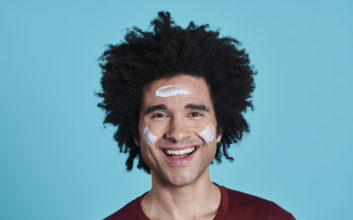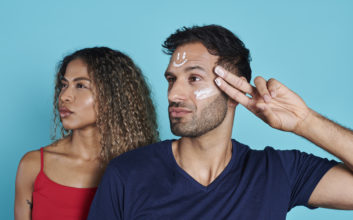Men’s Skin Care Must-Haves: Hyaluronic Acid & Allantoin

Your face won’t always be a smooth, unblemished miracle, but it will always be yours. Every line, freckle and wrinkle hints at the life you have lived; one full of ear to ear grins (hopefully), animated expressions and—inevitably, unavoidably—moments of anguish.
It is your identity and calling card, mugshot and money-maker. And like anything that’s going to be stuck on you for the rest of your days, you want to take top-notch care of it. It’s why we released Wrinkle Warrior and Mr Moisturiser, face creams engineered to keep your skin looking youthful and feeling healthy.
Your face won’t always be a smooth, unblemished miracle, but it will always be yours.
“How?” We hear you ask. Well, through a combination of skin-friendly ingredients. Two of which, Hyaluronic Acid and Allantoin, we are going to unravel to give you a better understanding of the products we’re so proud of.
Hyaluronic Acid and Allantoin: What Are They?
Hyaluronic Acid (HA) is a naturally occurring substance that can be found in the eyes, joints and, more than anywhere else in your body, the skin. Commonly known as the substance in injectable dermal fillers, just one gram of hyaluronic acid has the remarkable ability to hold up to six litres of water. Making the skin feel and appear hydrated, plump and healthy.
Allantoin is a chemical compound produced by the oxidation of uric acid. If that’s caused you to do a double take, don’t worry! The allantoin present in cosmetics and toiletries, including toothpaste, moisturiser and sunscreen, is commonly derived as a botanical extract of the comfrey plant.
How do they work?
Hyaluronic acid has a unique capacity to bind and retain water within cells, meaning it keeps eyes moist, joints cushioned and skin hydrated. The more HA present in your skin, the smoother and plumper it will look.
As you age, the amount of HA that naturally occurs in the outer-layer of skin—the epidermis—diminishes, a process hastened by external factors like UV damage and smoking. By applying a product containing HA to skin, you re-up the key molecule involved in retaining moisture within your body’s largest organ. And moisture is a wrinkle’s worst enemy.
Allantoin works by increasing the water content of the extracellular matrix, a network of molecules partly composed of collagen, the protein responsible for keeping your skin elasticated and springy. In other words, Not Saggy. It also improves the—deep breath—desquamation of skin, which is the official way of saying ‘sloughs away dead skin cells and encourages the production of new ones’ or, even more basic, makes your skin look less rough and scaly, more smooth and healthy.
Thanks to its ability to stimulate the growth of healthy tissue, allantoin is often found in after-sun and anti-acne products.
What are the Benefits of Hyaluronic Acid and Allantoin?
A heady cocktail of UV rays, questionable lifestyle choices and the relentless passage of time causes our skin to wrinkle, discolour and dry out. This is called ageing, and even if you rock SPF 50 every day and ditch all forms of alcohol, your skin is still going to feature a few fine lines at some point.
However, they won’t be so entrenched if you regularly apply products containing Hyaluronic acid and allantoin (although rocking SPF 50 and cutting down on the booze is also a good idea, mind).
A heady cocktail of UV rays, questionable lifestyle choices and the relentless passage of time causes our skin to wrinkle, discolour and dry out.
The benefits of using these ingredients include smooth skin that feels hydrated and healthy. The regular application of allantoin will also shield you against epidermal irritation and speed up the healing of any cuts and nicks your skin suffers.
HA and allantoin might not make you look 20 years younger, but they can realistically help you look like an altogether fresher, brighter version of yourself.
Like anything applied topically to the skin, some people can experience a bad reaction to products containing Hyaluronic Acid or allantoin. This is extremely rare, but if you do notice any itching, rashes or swelling, stop using the product and seek medical attention.
In a nutshell...
The ageing of human skin is a complex biological process affected by external factors like exposure to the sun, pollution levels and diet. Even so, ageing is unique to the individual, and a city-boy who regularly bikes to work behind a back-firing gritter before smoking a pack of cigarettes in the midday sun could still have a better complexion than a tee-total wellness vlogger. It’s unlikely, but definitely possible.
However, one thing is certain: skin ages as it loses moisture, so giving it the tools it needs to keep its hydration levels topped up, like our friends HA and allantoin, should help you preserve that unblemished miracle of a face for a little while longer.

